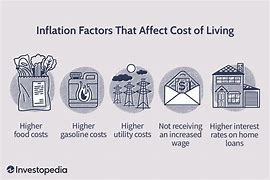
Okay, buckle up buttercups, because we’re diving headfirst into a topic that’s affecting families worldwide – inflation! It’s not just a fancy economic term anymore; it’s impacting our grocery bills, our gas tanks, and even our Netflix subscriptions, ouch!. Rising living costs are a global headache, and millions of families are scrambling to find ways to cope. This isn’t your grandma’s gentle price increase, this is a full-blown cost-of-living crisis impacting every corner of the globe – from bustling metropolises to quiet rural communities!.
So, what’s causing all this financial chaos? Well, picture this: supply chain issues (thanks, pandemic!), soaring energy prices, and a whole mess of geopolitical uncertainties all swirling together in a perfect storm of inflation. The result? Everyday essentials are suddenly looking a lot more expensive, leaving families worldwide feeling the pinch. Are you feeling that pinch too? You’re not alone!.
We’re talking about a massive global challenge, affecting everyone from single parents juggling multiple jobs to two-income households nervously eyeing their bank balances. This isn’t just about tightening belts; it’s about making incredibly difficult choices. It’s about deciding between paying for groceries or filling up the car. It’s about sacrificing hobbies and dreams just to keep a roof over your family’s head!.
This article isn’t about blaming anyone or offering unrealistic solutions, instead, it aims to be a beacon of hope in uncertain times. We’ll explore real-life coping strategies that families around the world are using to weather this financial storm. We’ll examine how communities are supporting each other & what governments are doing – or should be doing – to alleviate the burden. Think of this as your survival guide for navigating inflation; a handbook packed with practical tips & insightful perspectives to help you navigate this tricky situation effectively. From budget-friendly meal planning to savvy energy saving techniques, & even creative ways to generate extra income; we’ll leave no stone unturned in our quest to provide helpful information for struggling families everywhere. Are you ready to tackle inflation head-on? Let’s get started!.
Navigating Inflation: How Families Are Coping with Rising Living Costs Worldwide
Related Post : The Global Energy Crisis: What’s Behind the Rising Energy Prices?
Inflation. The word itself feels heavy, doesn’t it? It’s a global phenomenon impacting families everywhere, squeezing budgets and forcing difficult choices. Understanding the forces behind rising costs is the first step towards navigating this challenging economic landscape.
Understanding the Global Impact of Rising Costs
What is inflation, and why are prices rising globally? Inflation, simply put, is a general increase in the prices of goods and services in an economy over a period of time. This rise in the general price level of goods and services is often due to a combination of factors: increased demand, supply chain disruptions, geopolitical instability, and government policies.
How does inflation affect different countries and regions differently? The impact of inflation varies significantly depending on a nation’s economic structure, its reliance on imports, and the strength of its social safety nets. Developing nations often bear the brunt of rising costs more acutely, as a larger percentage of their income goes towards essential goods and services.
The role of supply chain disruptions in driving up prices. The pandemic exposed the fragility of global supply chains. Disruptions in manufacturing, transportation, and logistics have led to shortages and price increases across various sectors.
The impact of geopolitical events on inflation and rising costs. Global conflicts and political instability can significantly impact inflation. These events can disrupt trade, increase energy prices, and create uncertainty in the markets, all contributing to rising costs.
Inflation’s effect on essential goods and services (food, energy, housing). The most immediate and painful impact of inflation is felt in the cost of essentials. Food, energy, and housing are all experiencing significant price increases, leaving many families struggling to make ends meet.
Family Budgets Under Pressure: Strategies for Coping with Inflation
How rising costs are impacting family budgets worldwide. Families worldwide are feeling the pinch. Many are forced to cut back on non-essential spending, deplete savings, or even take on additional debt to cover rising costs.
Tracking your family’s spending habits and identifying areas for savings. The first step to tackling rising costs is understanding where your money is going. Tracking expenses, even using simple spreadsheets or budgeting apps, can reveal hidden spending patterns and areas for potential savings.
Creating a realistic budget that accounts for inflation and rising living costs. A realistic budget is crucial. It should include all income sources and expenses, factoring in the current inflationary pressures. This helps families prioritize spending and avoid unnecessary debt.
Negotiating bills and exploring options for reducing monthly expenses. Don’t be afraid to negotiate! Contact your service providers (internet, phone, insurance) to explore ways to lower your monthly bills. Consider switching providers if better deals are available.
Utilizing budgeting apps and tools for effective financial management. Many free and paid apps can help manage your finances. These tools can automate budgeting, track spending, and provide insights into your financial habits.
Saving Money and Stretching Your Budget During Inflation
Smart shopping strategies to combat rising food prices. Planning meals, comparing prices, buying in bulk (when appropriate), and utilizing coupons and loyalty programs can help stretch your food budget.
Finding affordable and healthy meal options for families. Prioritize affordable and nutritious foods. Focus on seasonal produce, legumes, and whole grains.
Reducing energy consumption and lowering utility bills. Conserve energy by switching to energy-efficient appliances, reducing heating and cooling usage, and turning off lights when leaving a room.
Exploring cheaper transportation options (carpooling, public transport). Consider carpooling, using public transport, cycling, or walking to reduce transportation costs.
Cutting back on non-essential expenses and prioritizing needs over wants. Differentiating needs from wants is key. Focus on essentials and postpone or eliminate non-essential spending.
Government Initiatives and Support for Families Facing Rising Costs
Government programs and subsidies aimed at easing the burden of inflation. Many governments are implementing measures to mitigate the impact of inflation, such as targeted subsidies on essential goods and increased social welfare programs.
Financial assistance programs for low-income families. Low-income families often need additional support. Explore available government assistance programs in your region.
Tax breaks and other financial incentives to help families cope. Some governments are offering tax breaks or other financial incentives to help families manage rising costs.
The role of government policies in controlling inflation and rising costs. Government policies play a critical role in managing inflation. These policies, however, need to be carefully designed to avoid unintended consequences.
Accessing available resources and support in your community. Local community organizations often offer valuable resources and support to families struggling financially.
Long-Term Financial Planning in an Inflationary Environment
Investing wisely to protect your savings from inflation. Investing in assets that outpace inflation is crucial for long-term financial security.
Building an emergency fund to cover unexpected expenses. An emergency fund acts as a buffer against unexpected costs and helps avoid going into debt during difficult times.
Exploring additional income streams to supplement family income. Consider part-time work, freelancing, or other income-generating activities to supplement your family’s income.
The importance of financial literacy in navigating inflationary periods. Financial literacy is crucial. Understanding basic financial principles empowers families to make informed decisions and manage their finances effectively.
Long-term strategies for safeguarding your family’s financial future amidst rising costs. Long-term financial planning is key to securing your family’s future, even in times of economic uncertainty.
Community Support and Resources for Families Facing Hardship
Finding local food banks and community support organizations. Food banks and community organizations provide crucial support to families facing food insecurity.
Accessing free or low-cost childcare options. Childcare costs can significantly impact family budgets. Explore local options for affordable childcare.
Utilizing community resources for job training and employment assistance. Community resources can help individuals acquire new skills and find employment opportunities.
Connecting with support groups and other families facing similar challenges. Sharing experiences and connecting with others facing similar challenges can provide emotional support and practical advice.
Building a strong support network to cope with financial stress. A strong support network is essential for navigating challenging financial times.
Conclusion: Adapting and Thriving Despite Rising Living Costs
Navigating inflation requires proactive planning, resourcefulness, and community support. By implementing smart strategies and seeking available resources, families can adapt and thrive, even amidst rising living costs.
